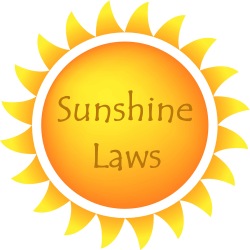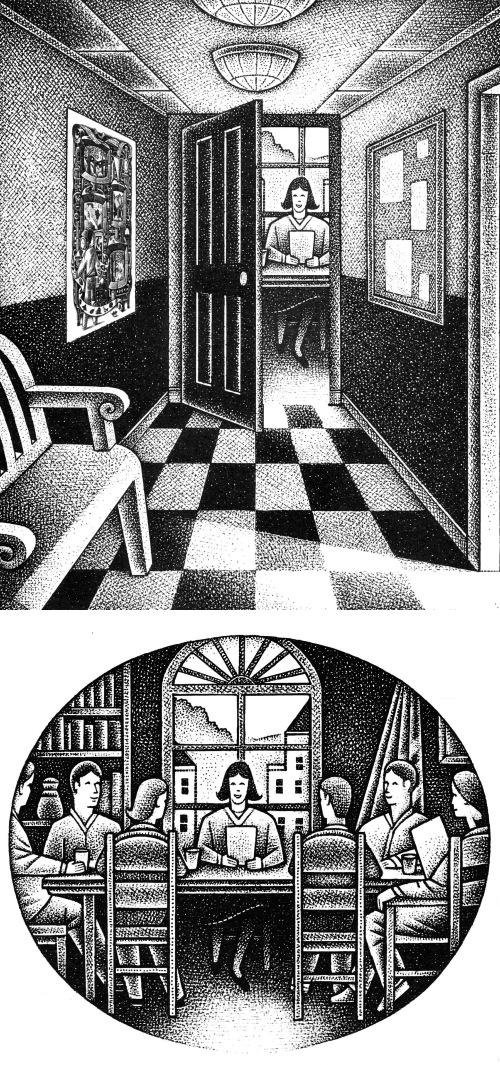 If you are a member of any type of local planning commission or zoning board — planning commission, board of zoning appeals, architectural review board, whatever — you may find yourself subject to the requirement of your state’s Open Meetings law, sometimes referred to as “Sunshine Laws.”
If you are a member of any type of local planning commission or zoning board — planning commission, board of zoning appeals, architectural review board, whatever — you may find yourself subject to the requirement of your state’s Open Meetings law, sometimes referred to as “Sunshine Laws.”
The legislatures of every state and the District of Columbia have enacted such statutes to protect the right of the public to be advised of and to observe the performance of public officials and the deliberations and the decisions that go into the formation of public policy. In a large number of states, these laws apply to local government, including land use boards and commissions.
Open Meeting laws generally share a basic structure of coverage and requirements, but can differ significantly in their details. Such differences make it critical for board members to obtain clear direction from legal counsel for their local government regarding when and how to comply with their state’s Open Meetings law. While not a substitute for obtaining guidance from legal counsel, many states have published a guide to their Open Meetings law. These frequently may be found on the website of the state’s Attorney General.[ref]For examples of such guides, check the state Attorney General websites in California, Florida, Massachusetts, and Ohio.[/ref]
Open Meeting laws seek to ensure:
(1) the right of citizens to receive timely and adequate notice of when and where a public body will meet and what will be discussed/decided at that meeting, and
(2) that public bodies will deliberate and decide the matters before them with the public present unless that business falls within a small number of specified exceptions.
Given these goals, every Open Meetings Law specifies:
• the public bodies to which the law applies,
• which “meetings” are covered by the law,
• what constitutes adequate notice of such a meeting,
• requirements to ensure meetings are “open to the public” and minutes of meetings are maintained, and
• under what circumstances, if any, a public body may discuss/decide a matter behind closed doors, shielded from the obligation that the public be present.
Coverage of Open Meeting Laws
In general, Open Meetings laws impose their requirements quite broadly, so if you are in a state that applies its Open Meetings Law to local government, it will almost certainly apply to every board or commission involved with land-use decisions.
The Ohio Open Meetings Law coverage provision below illustrates the extensive reach of these laws. Coverage in Ohio extends to: “[a]ny board, commission, committee, council, or similar decision-making body of a state agency, institution or authority, and any legislative authority or board, commission, committee, council, agency, authority, or similar decision-making body of any county, township, municipal corporation, school district, or other political subdivision or local public institution … .”[ref]Ohio Rev.Codes Sec. 121.22B(1)(a).[/ref] Further, the Ohio law also covers any committee or subcommittee of a body just described.[ref]Ohio Rev.Codes Sec. 121.22B(1)(b).[/ref]
What Constitutes a “Meeting”?
If we assume that your board or commission is covered by your state’s Open Meetings law law, the next question is what constitutes a “meeting” to which the law applies?

That’s an easy question for regularly-scheduled or “special” meetings: they all come within the requirements of the law.
— But what if two or three board members meet informally with staff to discuss a pending application?
— What if those same board members meet without staff present?
— Does the law cover the board’s visit to the site of a proposed new development?
— Does it make a difference if the board members visit that site individually?
— Is an e-mail exchange between staff and members of the board covered by the law?
— What about e-mails or telephone calls exchanged between board members? Messages on Facebook? Tweets?
As you might have expected, the answers to these questions depend on the particular circumstances in each instance and how your state’s Open Meetings law is applied to those circumstances. I’ll talk more about these questions in Part 2 of this article tomorrow.
Generally, a board or commission has to meet three requirements whenever a “meeting” is covered by an Open Meetings Law.
First, the board has to provide timely and adequate advance notice of the meeting. The specifics of that requirement will vary from state-to-state and also can be different for regularly-scheduled meetings versus “special” meetings. Many states also have provisions requiring that additional notice be provided to the press — particularly for “special” meetings — or other provisions whereby members of the public may, for a fee, request that they receive notice about specific types of business that may come before the board.
Second, the board has to ensure that the meeting is “open to the public.” Normally, this requirement means little more than assuring that the meeting room is identified and accessible. But issues can arise under unusual circumstances.
Here’s one example:
A board that regularly draws only a handful of attendees in a room that seats twenty could run afoul of the “open to the public” requirement if it meets in that same room when a highly contentious development application or proposed amendment is on the agenda. If 150 people show-up for a meeting in a room with an occupancy limit of 30 there is real potential for an Open Meetings violation if the board just goes ahead with the meeting in that room.
If a large enough room is available in the same building the meeting should be moved there.
If no single room can accommodate the public, another option, if the technology is available, would be to telecast or webcast the meeting to several rooms.
Frequently, the best approach is to table the matter and reschedule the meeting at a location that can accommodate the numbers who want to attend.
The third general requirement found in Open Meetings laws is that the board keep minutes of its meetings and make those available to the public. The required extent of coverage of such minutes will vary from state-to-state. Coverage requirements will also vary depending on whether the board was conducting a meeting open to the public or was deliberating in executive session, with the requirements relaxed significantly for the latter.
That brings us to one other issue addressed in Open Meetings laws: provisions for meeting in executive session. As was noted previously, Open Meetings Laws may provide for certain matters to be discussed behind closed doors. Some states allow executive sessions for a relatively large number of matters, while others are far more restrictive. Similarly, the procedures required to enter into executive session vary from state-to-state. I’ll discuss executive sessions in more detail tomorrow.
It should be clear by now that while Open Meetings Laws are quite similar in their general features, they differ significantly in the details of their coverage and requirements. Nothing will substitute for getting clear and direct guidance from legal counsel about how to comply with your state’s Open Meetings Law.
Go to Part 2 of the article
Professor Alan C. Weinstein holds a joint faculty appointment in the Cleveland-Marshall College of Law and the Maxine Goodman Levin College of Urban Affairs, and also serves as Director of the Colleges’ JD/MPA and JD/MUPDD Dual Degree Programs and Law & Public Policy Program. He is a nationally recognized expert on planning law who writes and lectures extensively in this field.
Weinstein is a past-Chair of the Planning & Law Division of the American Planning Association (APA), is one of the twenty-eight planning law experts who serve as Reporters for APA’s monthly journal, Planning & Environmental Law, and previously served as Chair of the Sub-Committee on Land Use & the First Amendment in the American Bar Association’s Section of State & Local Government Law.
Join a discussion of open meeting laws on our LinkeIn group page — post your comments & questions about situations you’ve faced.